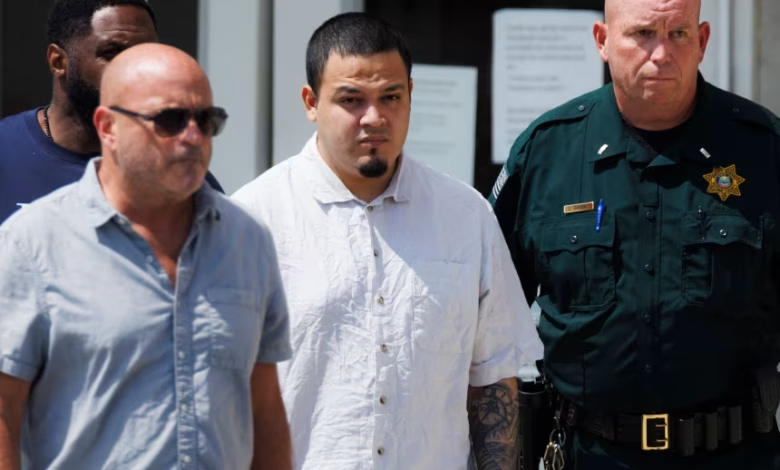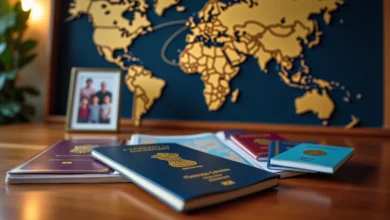
ICE Moves to Deport Abrego Garcia to Uganda
Kilmar Abrego Garcia’s deportation case has taken an unexpected turn under Trump’s policies. The Maryland resident faces immediate removal to Uganda mere hours after reuniting with his family. The Department of Homeland Security sent Abrego Garcia a notice stating he “may be removed to Uganda no less than 72 hours absent weekends”.
A brief moment of joy turned to distress for Abrego Garcia. He had just seen his family “for the first time in more than 160 days” after being released from a Tennessee jail on Friday. The Trump administration’s swift deportation plans cut his reunion short. This case has become central to Trump’s deportation policy debates. Officials later revealed Abrego’s rejection of a deal that would have sent him to Costa Rica in exchange for pleading guilty to human smuggling charges.
The sheet metal apprentice now faces an unexpected deportation to Uganda instead of his scheduled January trial for human smuggling allegations. This development came less than 24 hours after federal authorities released him. His case continues to fuel national discussions about Trump’s controversial deportation policies.
ICE Issues Uganda Deportation Notice After Jail Release
Immigration officials quickly threatened to deport Abrego Garcia to Uganda just hours after his release from jail. His lawyers received official notification from the Department of Homeland Security stating he “may be removed to Uganda no earlier than 72 hours from now (absent weekends)”. This action aligned with Trump’s deportation plan targeting the Salvadoran man.
Abrego Garcia’s lawyers received the notice moments after his release from criminal custody while awaiting his federal trial. His attorneys kept him in jail for roughly 11 weeks because they worried about immediate deportation, even though he qualified for pretrial release.
U.S. District Judge Paula Xinis had ruled that deportation proceedings must start in Baltimore. The judge required ICE to give three business days’ notice before starting any deportation process. This decision came after Abrego Garcia’s civil lawsuit challenged his original deportation’s legality, which the administration later admitted was an “administrative error”.
Abrego Garcia left the Tennessee jail on Friday wearing jeans and a white button-down short-sleeved shirt. He stepped into a waiting SUV. His release conditions required him to go straight to Maryland where he would stay under home detention with his brother serving as custodian.
The court also specified that “he is taken into ICE custody, he is required by the conditions of his release to consent to being transported back to this district for further proceedings in this case”. Notwithstanding that, Abrego Garcia must check in at Baltimore’s Immigration and Customs Enforcement office on Monday. This requirement could lead to a clash over Donald Trump’s deportation policy.
Trump Administration Offers Costa Rica Deal Before Uganda Threat

Image Source: Instagram
The Trump administration gave Abrego Garcia another option before threatening deportation to Uganda. Court documents show officials proposed a deal to him late Thursday. They wanted to deport him to Costa Rica instead of Uganda. The deal came with tough conditions – he would stay in jail, admit guilt to human smuggling charges, and complete his sentence before transfer.
Costa Rica’s government had agreed to take him. Costa Rica’s Minister Mario Zamora Cordero sent a letter to the U.S. Embassy that confirmed they would accept Abrego Garcia after he finished any criminal sentence. The country also promised to give him refugee status or residency when he arrived.
This deal had two clear benefits – Costa Rica shares his native El Salvador’s language, Spanish, and he “would be welcomed as a legal immigrant and wouldn’t face the possibility of detention”.
Abrego Garcia refused to stay in jail longer and left on Friday. The administration’s position changed quickly after that. His lawyers learned he had until Monday morning “to accept a plea in exchange for deportation to Costa Rica, or else that offer will be off the table forever”.
This quick deadline shows what his lawyers call a “coordinated effort” in Trump’s deportation policy to make Abrego Garcia admit guilt.
Lawyers Accuse Government of Vindictive Prosecution
Image Source: New Jersey Monitor
Abrego Garcia’s attorneys filed a forceful motion Tuesday that sought dismissal of human smuggling charges and called the case a “vindictive and selective prosecution” by the Trump administration. The 35-page legal filing claims President Trump’s Justice Department pursued criminal charges to retaliate directly against Abrego Garcia’s successful challenge to his wrongful deportation.
“Kilmar Abrego Garcia has been singled out by the United States government,” his attorneys stated in court documents. “Mr. Abrego was charged because he refused to acquiesce in the government’s violation of his due process rights.”
The motion acknowledges such dismissal requests “infrequently made and rarely succeed” but maintains “if there has ever been a case for dismissal on those grounds, this is that case”. The legal team highlights “a wide-ranging and unprecedented retribution campaign” that started after Abrego Garcia embarrassed officials by fighting his deportation.
The attorneys claim the prosecution shows a “coordinated effort” between the Department of Justice and Department of Homeland Security to force Abrego Garcia into pleading guilty. Officials demonstrated this coordination when they changed their offer from Costa Rica deportation to Uganda removal within 24 hours of his release.
Homeland Security Secretary Noem has labeled Abrego Garcia a “monster” and “public safety threat” during this legal battle. His attorneys point out that the government “has never produced an iota of evidence” connecting him to MS-13.
The Abrego Garcia case shows how aggressively Trump’s deportation policies work in practice. A judge had ruled that proper notice and proceedings were necessary. Yet officials were quick to threaten deportation to Uganda—a country with no clear link to this Salvadoran man. Multiple government agencies seemed to work together, as shown by their sudden move from offering Costa Rica to threatening Uganda deportation just 24 hours after his release.
The choice given to Abrego Garcia was stark: plead guilty or face deportation to Uganda. This ultimatum raises crucial questions about immigrant’s due process rights. His lawyers say this shows how the system punishes those who fight back against wrongful deportation. The government’s labels of “monster” and “public safety threat” don’t match the available evidence.
Abrego Garcia’s emotional journey has been intense. He barely had time to reunite with his family after 160 days apart before facing new deportation threats. His case now stands at the center of the immigration debate about deportation policy implementation and constitutional rights. Legal experts and immigration advocates watch his upcoming ICE appointment with great interest. His case might shape how similar situations play out under the current administration.






